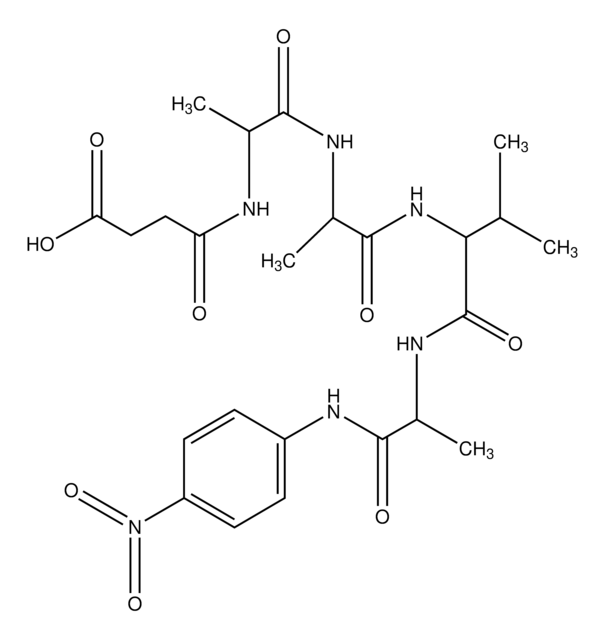E7885
Elastase from porcine pancreas
lyophilized powder, suitable for cell culture
Synonym(s):
Elastase from hog pancreas, Pancreatopeptidase E
About This Item
Recommended Products
biological source
Porcine
Quality Level
form
lyophilized powder
specific activity
≥4 units/mg protein
mol wt
25.9 kDa
packaging
pkg of 1 μmol
technique(s)
cell culture | mammalian: suitable
pH
8
suitability
suitable for
foreign activity
Trypsin ≤50 BAEE units/mg protein
shipped in
dry ice
storage temp.
−20°C
Looking for similar products? Visit Product Comparison Guide
General description
Application
- Cell culture techniques
- ELISA techniques
- Used in assay for elastase inhibitory activity
Biochem/physiol Actions
Packaging
Unit Definition
Application
inhibitor
Signal Word
Danger
Hazard Statements
Precautionary Statements
Hazard Classifications
Eye Irrit. 2 - Resp. Sens. 1 - Skin Irrit. 2 - STOT SE 3
Target Organs
Respiratory system
Storage Class Code
11 - Combustible Solids
WGK
WGK 3
Flash Point(F)
Not applicable
Flash Point(C)
Not applicable
Certificates of Analysis (COA)
Search for Certificates of Analysis (COA) by entering the products Lot/Batch Number. Lot and Batch Numbers can be found on a product’s label following the words ‘Lot’ or ‘Batch’.
Already Own This Product?
Find documentation for the products that you have recently purchased in the Document Library.
Customers Also Viewed
Articles
Discover pre-mixed collagenase enzyme blends with DNase I, Dispase II, Elastase, and Hyaluronidase and gently dissociate animal tissues in vitro.
Discover pre-mixed collagenase enzyme blends with DNase I, Dispase II, Elastase, and Hyaluronidase and gently dissociate animal tissues in vitro.
Discover pre-mixed collagenase enzyme blends with DNase I, Dispase II, Elastase, and Hyaluronidase and gently dissociate animal tissues in vitro.
Discover pre-mixed collagenase enzyme blends with DNase I, Dispase II, Elastase, and Hyaluronidase and gently dissociate animal tissues in vitro.
Protocols
Enzymatic Assay of Elastase (EC 3.4.21.36), a continuous spectrophotometric rate determination.
Enzymatic Assay of Elastase (EC 3.4.21.36), a continuous spectrophotometric rate determination.
Enzymatic Assay of Elastase (EC 3.4.21.36), a continuous spectrophotometric rate determination.
Enzymatic Assay of Elastase (EC 3.4.21.36), a continuous spectrophotometric rate determination.
Chromatograms
application for HPLCOur team of scientists has experience in all areas of research including Life Science, Material Science, Chemical Synthesis, Chromatography, Analytical and many others.
Contact Technical Service


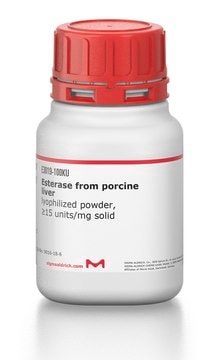
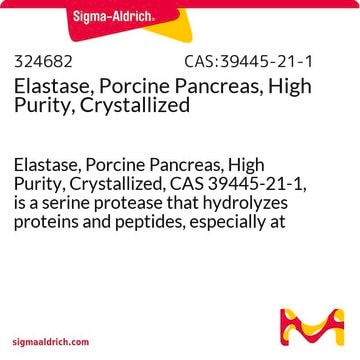
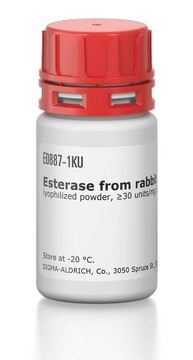





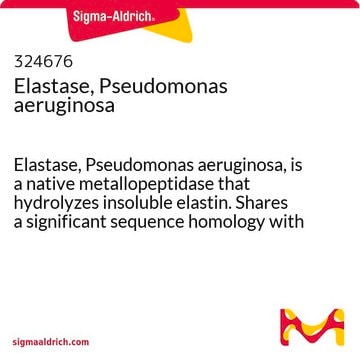
![N-[3-(2-Furyl)acryloyl]-Leu-Gly-Pro-Ala](/deepweb/assets/sigmaaldrich/product/structures/805/876/96b5fb57-71c8-4c6b-b5d2-fafe7374cd85/640/96b5fb57-71c8-4c6b-b5d2-fafe7374cd85.png)


